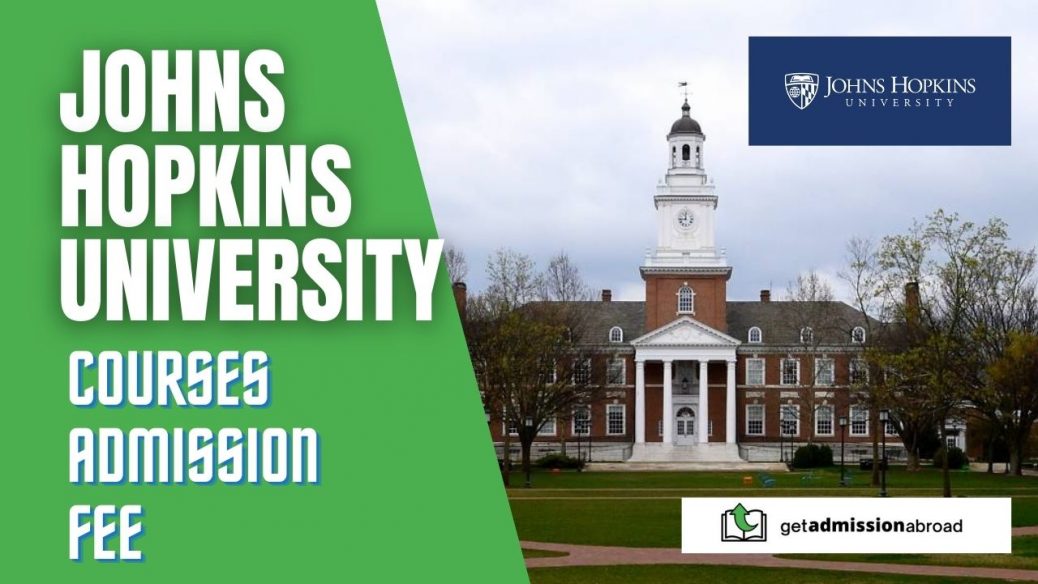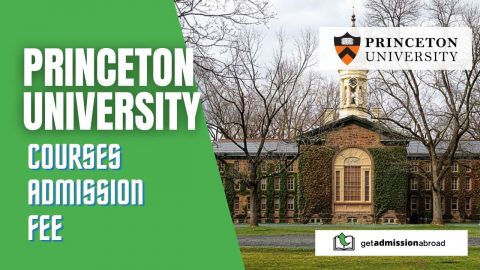The Johns Hopkins University is a private university in Baltimore, Maryland. Founded in 1876, the American contractor, abolitionist and philanthropist Johns Hopkins was named after his first benefactor.
It has been the first US research university to forge a path for higher learning institutions and today this invests more research money than any other US academic institution. It is also widely acknowledged as the first US University to combine teaching and research which revolutionizes higher education. To date, Johns Hopkins has produced 27 Nobel Prize winners, including Woodrow Wilson, past President of the United States.
Johns Hopkins is organized in 10 campus divisions in Maryland and Washington, and in Italy, China and Singapore, DC with international sites. Johns Hopkins consistently rates among the top 10 US institutions and, in addition, with his undergraduates ‘ programs, is globally competitive.
Over 260 arts and music, humanities, social and natural sciences, in genie-groups, international studies, education, business and health professions are all part of Johns Hopkins’s 9 academic divisions with over 24,000 full-and part-time students. Johns Hopkins is involved in more than 260.
Graduates are generally ranked among the top 10% of their secondary school class, and applications have been increased over time and selectivity. The acceptance rate was 11.4 percent of group students in 2020.
In the North Baltimore campus, this includes the colleges of architecture, the arts and science, most of the Johns Hopkins student’s research at homewood. In a big, thriving city of red brick houses, tree line-lined streets, an emblematic clock tower and large green quads, it is a traditional college atmosphere.
Johns Hopkins University Ranking
At National Universities, Johns Hopkins University is ranked #10. Schools are ranked across a set of widely accepted indicators of excellence according to their performance.
- #10 National Universities (tie)
- #19 Best Value Schools
- #23 Most Innovative Schools (tie)
Fee Structure in Johns Hopkins University
Johns Hopkins University’s 2019 undergraduate tuition & fees are $53,740 for their students and $55,816 for the 2019 graduate school tuition & fees. 3,232 students (52.91% of enrolled undergraduate students) received grants and an average of $38,268. After receiving financial assistance, Johns Hopkins University’s net price is $33,633 including tuition, fees, books & supply costs, and living costs. The fee for Johns Hopkins University’s undergraduate program is about the average amount of similar school tuition & Research University.
Courses in Johns Hopkins University
Following are the courses for Johns Hopkins University:
- Applied Biomedical Engineering
- Applied and Computational Mathematics
- Applied Physics
- Chemical and Biomolecular Engineering
- Civil Engineering
- Computer Science
- Cyber security
- Data Science
- Electrical and Computer Engineering
- Engineering Management
- Environmental Engineering
- Environmental Engineering and Science
- Environmental Planning and Management
- Financial Mathematics
- Healthcare Systems Engineering
- Information Systems Engineering
- Materials Science and Engineering
- Mechanical Engineering
- Space Systems Engineering
- Systems Engineering
- Technical Management
Required Documents in Johns Hopkins University
Here are the Application requirements for admission:
- Completed application
- Translated from all previous work
- Three letters of reference
- Previous GRE general and topic results (physics or similar field)
- TOEFL or IELTS for international students (reproduction is appropriate. Johns Hopkins recommends a score of at least 600 (paper-based) or 250 (computer-based) or 100 (Internet-based) in the Test of English as a Foreign Language (TOEFL).
- Statement of purpose
- $75 application fee. Registration / participation in one of the following programs may be deferred to applicants registered (must be submitted within the application): GEM, Department Petition, SACNAS, MMUF, POSSE, JHU Grad Student, ABRCMS, McNair, IRT, Vietnam Education Foundation, Graduate Horizons, Chocktaw / Chickasaw Scholarship Advising System, Baltimore Scholars Program, Leadership Alliance. To petition for an exemption on the grounds of financial hardship, please select the eligibility form and submit one of the following: FAFSA SAR Statement, correspondence from the College / University Financial Assistance Program, unemployment confirmation. Don’t send a tax return. All records shall be checked and confirmed for sufficient proof. If the uploaded document is not accepted, you will be contacted to resubmit or pay the application fee.
Successful applicants qualifying for a Bachelor’s program in the last year will need to show the completion of their Bachelor’s degree course before they can start their Ph.D. program at JHU.
Admission Eligibility Criteria in Johns Hopkins University
TOEFL, IELTS or the Duolingo English Test (DET) is prescribed to candidates whose first language is not English or for learners who have not completed an English language school for the last three years. Although not needed, students who score below 690 on the Evidence-Based Reading and Writing (ERW) portion of the current SAT or below 30 or more on both the ACT Reading and the English parts are recommended to apply TOEFL, IELTS or DET ratings, as they will also show them in the best light for their language learning. Applicants should typically receive a minimum of 100 maximum of 26 (Reading), 26 (Listening), 22 (Writing), and 25 (Speaking) sub-scores for the Internet-based TOEFL (iBT). IELTS is expected to score 7.0 or higher on each group and the DET is expected to score 75 or higher.
The Environment of the College
Experience an amazing campus at Johns Hopkins University and learn how to be independent with the help of our incredible staff. Combining Johns Hopkins ‘ unparalleled educational, sporting, and social experiences, Summer Exploration will be an event you’ll never forget.
Living together at Johns Hopkins
When living at Johns Hopkins university, you will be part of a diverse family of students and staff staying together in a single residence hall.
Whether you’re watching a movie or collaborating on a group project, it’s great living with your family. And if you have any concerns, the Resident Counselor (RC) works in the hall and is there for you 24/7.
Here’s Our Recommended Setup
- Stay in a single, double or triple room in a suite.
- Share a washroom with your suite mates.
- Each room includes a bed, a study desk, a drawer, a closet and Wi-Fi.
- Lounges, computer rooms, laundry facilities and the Johns Hopkins Summer High School Office are all located in our residence hall.
- We’re just a short walk from the Fresh Food Market, academic buildings, and the Newton White Athletic Complex.
If you could do this setup, you may save a few bucks that would help you in coming months.
What is the entrance gateway?
The school has an acceptance rate of 13 percent that places # 2 at the lowest acceptance rate in Maryland. Last year, 3,405 out of 27,156 applicants were admitted to make Johns Hopkins a highly competitive school with low chances of typical applicants being accepted. Academically, there are exceptionally high requirements for admission test scores, generally admitting students who score in the top 2%. Johns Hopkins University generally accepts and attracts “A-” average high school students. Just 42% of those accepted have opted to enroll in university. Many graduates graduated in the upper ten percent of their high school class.
SAT Scores required to be accepted
Johns Hopkins University typically requires students to be in the top 1% of SAT exam winners. The school consistently takes SAT composite scores down to 1490 on a scale of 1600, below which entry should be deemed an accomplishment. We believe that some students could be admitted with SAT as small as 1440. The estimated average SAT composite for a freshman admitted is 1540 out of 1600. School ranks #1 in Maryland with the highest average SAT composite score. 43% of applicants submit SAT scores to the school.
ACT Scores needed to be accepted:
Admission data indicates that Johns Hopkins regularly accepts students with ACTs 33 and above. Successful applicants typically send ACT scores to the top 2% nationwide. In some instances, we estimate school acceptance of minimum ACT composite scores to be around 32. Prospective students who submit a composite ACT of 34 or more should be in the upper half of the applicants-and students of 35 or more should have very competitive chances. School ranks #1 in Maryland with the highest average ACT composite score. 56% of students apply ACT results to Johns Hopkins University.
Advantages of studying at Johns Hopkins University
Student Health Benefits
The Johns Hopkins University Student Health Benefits Plan is available for undergraduate and graduate students.
There are two health insurance policies for students: students at Carey Business School, Krieger School of Arts and Sciences, Peabody Institute, School of Advanced International Studies, School of Education, and Whiting School of Engineering have access to a program operated by Consolidated Health Plans, Inc. and partnered by Cigna for the health care provider network. Students at the School of Medicine, the School of Nursing and the Bloomberg School of Public Health have ties to a program funded by the Johns Hopkins Employer Health Program (EHP). More information on the EHP medical plan can be found here.
A VISION plan for students across the university is available from EyeMed starting in 2018; details on the coverage can be found via the link on the right of this page.
In addition, a DENTAL plan is available from Delta Dental for all schools that have not previously had coverage.
Hostel life in Johns Hopkins University
Student Housing Facility
Live on campus is an integral aspect of Hopkins ‘ undergraduate experience — nearly all of our Homewood-based undergraduates remain in residence halls for their first two years, and some stay longer.
Underclassmen have two options:
- Traditional residence halls, which consist mainly of doubles (that’s you and one roommate), with a few singles and shared bathrooms
- Suite-style arrangements including double, single or triple rooms; personal bathrooms; and central heating / air conditioning (some also include tiny kitchenettes) For others, there are plenty of condos and rented houses within walking distance of all four.
Live on campus is an integral aspect of Hopkins ‘ undergraduate experience — nearly all of our Homewood-based undergraduates remain in residence halls for their first two years, and some stay longer.
Student Dining
Johns Hopkins University is lucky to have on campus one of the best dining systems in the nation. In fact, Daily Meal, which praised our menu and our commitment to social responsibility, recently ranked No. 6 on the “Best Food Colleges.”
The dining facility at the Johns Hopkins University includes gluten-free, nut-free, trans-fat-free, vegetarian-friendly and kosher-friendly choices. You can choose home-smoked beef brisket, hand-rolled sushi and fresh organic salads in the Favorites menu.
Johns Hopkins University is also passionate about it’s duty to it’s family and to the world. It uses cage-free eggs, hormone-free milk, locally grown items, biodegradable paper products and phase out the use of plastic straw in our homewood food stores by September 2019.
Experience of the Past Alumni
Managing life / work balance was a struggle for me, as I work on Capitol Hill and has a wife and kids, but I didn’t regret it for a while. The time spent with Johns Hopkins Advanced Learning Programs was a prudent move in my future that will ultimately benefit my family and I, “said Mr. Jordan. ”Because of the professional value of my studies, my family, particularly my mother, was very supportive of me. The online courses are invaluable because I was able to complete my research at hours that were convenient for me, whether it was before school or after putting my kids to bed.”
MR. JORDAN (COMMUNICATIONS DIRECTOR FOR THE U. S. HOUSE OF REPRESENTATIVES SMALL BUSINESS COMMITTEE).
Other Top Universities in the USA
So how did you like the Johns Hopkins University? Are you planning to take an admission in the University? Check out the perks and cons of other Universities in the USA here.
You can also choose to Study in Europe or Study in Canada.










